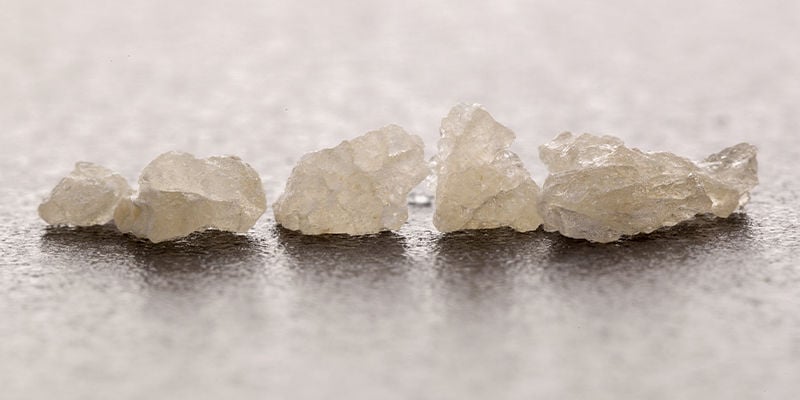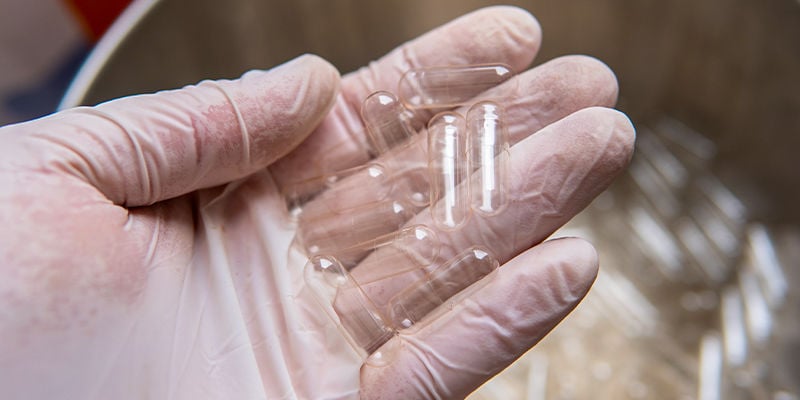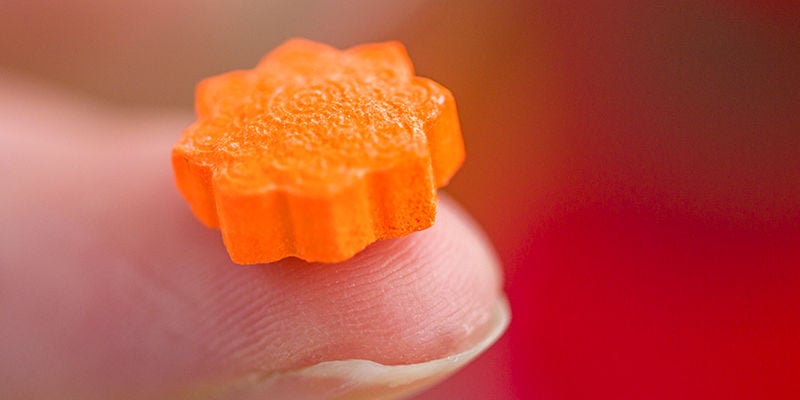
Microdosing MDMA: What You Need To Know
The practice of microdosing is becoming increasingly popular, with LSD and psilocybin among the most popular substances in this context. But what about other drugs? In this article, we discuss the potential benefits and risks of microdosing MDMA. While research on the topic is scarce, here are some facts you should be aware of.
Microdosing psychedelics is becoming increasingly popular and accepted, especially when it comes to psilocybin and LSD. Various other drugs that are currently widely illicit are being researched for their potential benefits in the context of psychotherapy. Among them is MDMA, a substance primarily known as a recreational drug, also referred to as molly or ecstasy (depending on where you are). Microdosing MDMA is a lot less common, and has been researched to a rather negligible extent. Summarising the information available, we’ll address some common questions around microdosing MDMA below.
What is MDMA?

MDMA (3,4-methylenedioxymetamphetamine) is a synthetic (human-made) psychoactive substance that produces stimulating and hallucinogenic effects.
In 1914, MDMA was patented for its potential as a medicine, after being synthesised for the first time in 1912. Indeed, psychiatrists used the substance for therapeutic purposes for several decades before the substance was banned in the context of the “War on Drugs” in the 1980s.
Researchers are now investigating MDMA’s potential to assist psychotherapy. For instance, studies are assessing the possibility for the substance to help in the context of treatment-resistant depression, PTSD (posttraumatic stress disorder), and couples therapy for fractured relationships.
What are the effects of MDMA?

MDMA increases the activity of (at least) three neurotransmitters in the brain, namely serotonin, dopamine, and norepinephrine. The substance triggers a release of these neurotransmitters (serotonin levels are affected most strongly), while temporarily blocking reuptake. Furthermore, MDMA decreases activity in the brain’s fear centre (the amygdala).
Below, we’ll list the typical effects of MDMA, but note that the substance can (and will) affect everyone differently. Your experience using the substance depends on obvious factors like dose, quality/purity of the substance you’re taking, individual body composition, diet, and so on, but also on less obvious factors like mood, psychological well-being, and set and setting.
Potential negative acute effects of MDMA include high blood pressure, neurotoxicity, faintness, panic attacks, and loss of consciousness and seizures (in severe cases). Fatal overdoses on MDMA are uncommon, but high doses can potentially be life-threatening.
On the positive side, typical acute effects of a full dose of MDMA may include:
- Euphoria
- Sensation of emotional well-being
- Increased extroversion and social openness
- Emotional warmth and increased empathy (MDMA is also referred to as an “empathogen”)
- Lowered inhibition to touch
- Increased openness to talk about intimate, emotionally charged matters
Note that the release of large amounts of serotonin caused by MDMA leads to a significant depletion of the neurotransmitter, meaning the drug can have negative psychological aftereffects in the days following consumption.
Why do people microdose MDMA?

Microdosing MDMA is far less common than microdosing psychedelics like LSD or magic mushrooms. People typically microdose MDMA to boost their energy levels, enhance their willingness/ability to socialise, or work through past trauma.
While MDMA has been researched in the context of psychotherapy, the practice of microdosing the substance has not been a focus of research. Primarily, scientists have investigated the potential benefits of a full dose taken up to three times under the supervision of an experienced team of therapists.
Risks of microdosing MDMA

Due to a lack of research on microdosing MDMA, the safety and effectiveness of the practice is ambiguous. The risks you’ll face also depend on the frequency with which you microdose, whether you’re doing it under the guidance of a health professional, and the quality/purity of the product.
Note that there’s a difference between taking an occasional microdose and microdosing frequently as part of a protocol. If you do the latter, tolerance will build quickly and the effects may stop working after one or two consecutive days (unless you continuously increase the dose).
Considering how it affects the activity of neurotransmitters, taking MDMA multiple times a week can seriously damage your serotonin levels, for instance. In turn, this can negatively impact your mental health and psychological stability.
Frequent use of MDMA can also impair physiological health, potentially causing increased blood pressure and heart stress.
Critics stress that tolerance and the way MDMA works in the body can lead to physical dependence and addiction.
Furthermore, it’s difficult to determine the quality/purity of the product since MDMA is illegal across countries. Regardless of whether you want to take a full dose of MDMA recreationally or try microdosing for therapeutic purposes, you want a pure product that has not been adulterated or laced with other substances, and you want to know how potent your MDMA is. MDMA purchased underground is highly unlikely to have the desired purity. To mitigate risks related to a lack of or false information about a substance, you can purchase drug test kits to use at home.
What exactly is an MDMA microdose?

Generally, a microdose of a substance is a subthreshold dose of a drug that does not produce any tangible effects, though it affects us at a cellular level. With MDMA, most users take 5–25mg as a microdose. Others advise to start with 3mg, while some others claim that a microdose is usually one-twentieth to one-tenth of a recreational dose.
Note that the difference between taking an occasional microdose and microdosing frequently as part of a protocol is relevant to defining the right dose as well.
How is MDMA usually microdosed?
So far, there’s no consensus on how to best microdose MDMA. However, it is often recommended to space out doses by one week, at the very least.
As mentioned, most users choose a dose between 5 and 25 milligrams. Others start with even smaller amounts, such as 200mcg.
Remember that it’s dangerous to consume MDMA frequently (see above).
What effects should you expect when microdosing MDMA?

A microdose is not supposed to get you high, which means you should not expect the full-blown effects of a full dose of MDMA. These are listed above as the “typical acute effects”.
As microdosing MDMA has not been the focus of research, and only few anecdotal reports are available, there’s little certainty about how it may affect you.
There have been dose-response trials where low doses of MDMA were administered to participants with PTSD in two sessions, which were spaced 3–5 weeks apart. However, these low doses were not necessarily subthreshold, starting at 25mg and going up to 40mg. Patients who received lower doses often reported reactions like anxiety and difficulty concentrating. In comparison to patients who received high doses, the former were more likely to face headaches and fatigue.
Again, the available information about the specific effects of microdosing is quite nebulous.
Microdosing MDMA — Yay or nay?

By now, it has probably become clear that the matter of microdosing MDMA is anything but straightforward. With the lack of research and limited availability of any credible information around the practice, it’s incredibly hard to judge whether doing it is a good idea or not, which is why it's often advised to refrain from it.
-
 3 min
20 August 2024
Molly, MDMA And Ecstasy: Whats The Difference?
Are you confused about the differences between Molly, Ecstasy, and MDMA? You're not alone. These terms are often used interchangeably in both the media and party culture. However, they aren't...
3 min
20 August 2024
Molly, MDMA And Ecstasy: Whats The Difference?
Are you confused about the differences between Molly, Ecstasy, and MDMA? You're not alone. These terms are often used interchangeably in both the media and party culture. However, they aren't...
-
 6 min
3 February 2023
How Often Should You Microdose?
Taking tiny amounts of psychedelics could boost your focus, creativity, and mood, all while you go about life as usual. Welcome to the practice of microdosing. But just how often should you do it?...
6 min
3 February 2023
How Often Should You Microdose?
Taking tiny amounts of psychedelics could boost your focus, creativity, and mood, all while you go about life as usual. Welcome to the practice of microdosing. But just how often should you do it?...









 United States
United States













